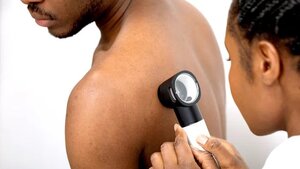Skin cancer screening is a process that involves examining the skin for signs of skin cancer or suspicious skin lesions. The purpose of screening is to detect skin cancer at an early stage when it is most treatable. Regular screenings are particularly important for individuals who have a higher risk of developing skin cancer, such as those with a family history of the disease or a personal history of extensive sun exposure.
Here are some key points about skin cancer screening:
Self-Examination: Performing regular self-examinations of your skin is an essential part of skin cancer screening. This involves thoroughly examining your skin from head to toe, including the scalp, face, neck, chest, back, arms, legs, hands, feet, and even the areas between the toes and fingers. Look for any new moles, growths, or changes in existing moles, such as changes in size, shape, color, or texture.
Professional Examination: It is recommended to have a professional skin examination by a dermatologist or other qualified healthcare provider. During a skin exam, the healthcare provider will carefully examine your skin, paying close attention to any suspicious areas or lesions. They may use a dermatoscope, which is a handheld device that magnifies the skin to aid in the examination of moles and other skin abnormalities.
Frequency of Screening: The frequency of skin cancer screenings depends on individual risk factors. In general, individuals with a higher risk of skin cancer may benefit from more frequent screenings. Consult with your dermatologist or healthcare provider to determine the appropriate screening schedule based on your specific risk factors.
Additional Diagnostic Tests: If a suspicious lesion or area is identified during a skin examination, your healthcare provider may recommend further diagnostic tests, such as a skin biopsy. A biopsy involves taking a small sample of the skin tissue for laboratory analysis to determine if it is cancerous or benign.
Sun Protection: Alongside regular screenings, practicing sun protection measures is crucial in reducing the risk of skin cancer. This includes wearing sunscreen with a high SPF, seeking shade during peak sun hours, wearing protective clothing, and avoiding indoor tanning.
It’s important to note that skin cancer screening does not guarantee the prevention or early detection of all skin cancers. It is still essential to be vigilant about changes in your skin and promptly report any concerns to your healthcare provider. Remember, early detection and timely treatment are key factors in improving outcomes for individuals with skin cancer.
Your Solution for Skin Transformation
If you’re seeking effective solutions for transforming your skin, look no further. Our clinic is dedicated to providing specialized treatments designed to address various skin concerns. Our team of experienced dermatologists will assess your specific needs and develop a customized treatment regimen to help you achieve your desired results. Discover the power of innovative skincare products, rejuvenating procedures, and personalized care, all aimed at helping you attain radiant and youthful skin.

